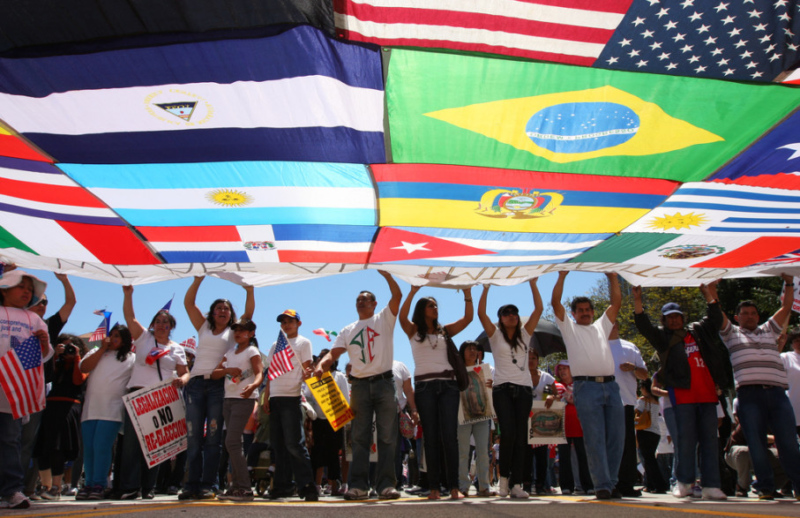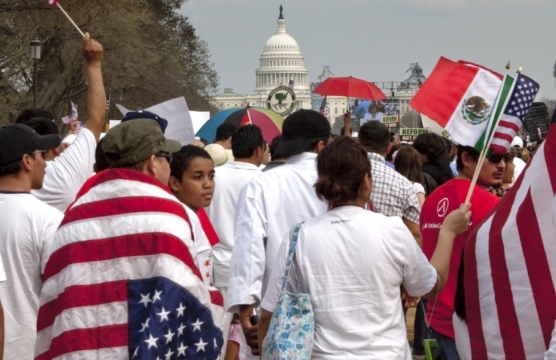Obama’s New Deportations Policy & the Future of Immigration
President Obama has overseen some of the strictest enforcement policies of the past several decades.
On Friday, September 19th, the Dialogue hosted a discussion on the future of immigration reform. The session featured Daniel Altschuler, managing director at Make the Road Action Fund, an organization focused on building the power and influence of immigrant New Yorkers, and Julieta Garibay, founding member of United We Dream, the largest immigrant youth-led organization in the nation. The Dialogue’s Michael Shifter moderated the discussion.
“Una bofetada,” commented Julieta Garibay on Obama’s decision to delay executive action on immigration reform. Garibay expressed how the president’s promise at the Rose Garden earlier this summer had given hope to millions of unauthorized immigrants that the administration had heard them and was ready to resolve the current immigration crisis. “This delay,” continued Garibay, “means that the president prefers politics rather than families.”
When asked to comment on Obama’s concern that an executive move on immigration would jeopardize Democrats control of the Senate, Altschuler also expressed disappointment. He explained that to him “delaying action to pass immigration reform in the future is insufficient”: when 50,000 people risk deportation between now and the elections, the better bet is to take executive action and energize Latino voters to ensure that the senate stays in democratic hands. Altschuler pointed out that already in 2012, Obama’s executive implementation of Deferred Action for Childhood Arrivals (DACA), which had made one million young immigrants eligible for a two-year deportation reprieve, had galvanized the Latino community into supporting Obama’s reelection.
Despite partisan antagonisms and presidential delays, both speakers highlighted the gains of advocacy at state and municipal levels. Altschuler emphasized that due to Make The Road Action Fund’s efforts on Long Island, an area of New York facing a steep increase in anti-immigrant hate crimes, public opinion was now more positive towards immigration reform. “We’ve had concrete policy gains,” explained Altschuler when referencing the New York State Senate’s executive order to offer translation services in local government offices. Make The Road Action Fund has also successfully connected children to court services: this past spring, the City Council approved $4.9 million to provide lawyers to every New York City resident who is detained and facing deportation.
But Altschuler and Garibay’s work extends farther than municipal victories. Garibay stressed that the goal is to push members of congress to support immigration reform: for her, even administrative aid is “a band-aid solution.” She also explained that what the Latino community ultimately needs is a “comprehensive reform, beyond immigration reform, that will provide immigrants with papers and support them in their path to U.S. citizenship.” To do that, she’s learned that “you cannot put your faith in princes or princesses, you need to put your faith in people.” Today, United We Dream is the largest immigrant youth-led organization in the nation with over 100,000 immigrant youth and 55 affiliate organizations in 26 states.
Despite Garibay and Altschuler’s clear policy aspirations, the scope of Obama’s immigration reform remains unclear. Obama has not specified how many of the 11.3 million illegal immigrants would benefit from a potential reform. Would the reform apply to dreamers who have lived in the US for at least 5 years or only to those who have been here for 10? To both speakers however, immigration reform is just the beginning of a long fight. Beyond a full packet of rights, ensuring that immigrants can thrive in their communities means tackling issues like college tuition, mortgages and healthcare. “It will take a long-term commitment,” concluded Garibay, for reform to respect “the humanity and dignity of people.”
President Obama has overseen some of the strictest enforcement policies of the past several decades.
As the global financial crisis continues to alter US relations with the hemisphere, greater engagement in the region remains critical to US interests.
Everyone recognized that the immigration system was a mess and needed to be fixed, but the politics were too polarized and complicated for any serious progress to be made.
 Pablo Serano/ SEIU / CC BY-NC-SA 2.0
Pablo Serano/ SEIU / CC BY-NC-SA 2.0
